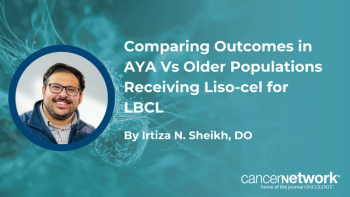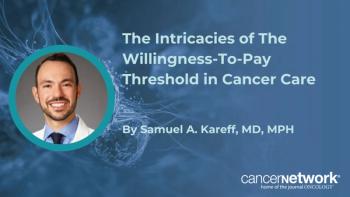
- ONCOLOGY Vol 12 No 3
- Volume 12
- Issue 3
Study Links Smoking in College to Other Risky Student Behaviors
College students who smoke not only are endangering their health but also are likely to have adopted other risky behaviors. A new study by researchers at Dana-Farber Cancer Institute and the Harvard School of Public Health has found that college students who smoke are more likely to use marijuana and other illegal drugs, to be sexually promiscuous, and to be uninvolved in sports and athletic activities.
College students who smoke not only are endangering their health but also are likely to have adopted other risky behaviors. A new study by researchers at Dana-Farber Cancer Institute and the Harvard School of Public Health has found that college students who smoke are more likely to use marijuana and other illegal drugs, to be sexually promiscuous, and to be uninvolved in sports and athletic activities.
The study, published in the January issue of the American Journal of Public Health, suggests that encouraging students to participate in more productive aspects of campus life might have the additional benefit of deterring them from smoking.
College presents an opportunity to reach smokers while society still has institutional access to them, says study coauthor Karen Emmons, PhD, of Dana-Farber and the Harvard School of Public Health. Smoking should serve as a warning sign to resident assistants and other college counselors that these students need to be drawn more fully into college life.
Large Number of Students Surveyed
The study is based on a survey of more than 17,000 students at 140 four-year colleges across the country. Students were asked to complete a questionnaire about their use of alcohol, cigarettes, and illicit drugs and to provide information on their living arrangements, lifestyle, and academic performance.
Analysis of the survey showed that 22% of the students had smoked within the previous 30 days and 25% were former smokersmeaning that almost half of all students surveyed had smoked at some point in their lifetime. Among the current smokers, 34% smoked at least half a pack a day and 14% smoked a pack or more a day. College smoking was found to be linked with a variety of behaviors that are either physically or psychologically unhealthy. Students who engaged in binge-drinking prior to college, for example, were almost twice as likely to smoke in college than students who did not binge-drink. Students who smoked were also more likely to use marijuana and to have had multiple sex partners during the previous month.
Lifestyle Choices Influence Smoking
Lifestyle choices were shown to exert a powerful influence on student smoking. Researchers found that smokers were less likely to participate in intercollegiate athletics (a trend that held for male students only) and tended to be less involved in community service, religion, arts, and productive activities and to be more involved in leisure activities. Membership in a fraternity or sorority also increased the likelihood of being a smoker, as did frequent attendance at parties.
One intriguing finding of the study was that risk-taking behavior was an even more powerful predictor of smoking in female students than in their male counterparts.
Clearly, there is a strong association between students lifestyle and the decision of whether or not to smoke, Emmons says. The link between high school binge drinking and college smoking may indicate that smoking among college students is part of a risk-taking lifestyle initiated well before college.
Encouraging Healthy Lifestyles
Fortunately, colleges and universities have at their disposal a variety of options for encouraging healthy lifestyles among students, Emmons notes, from policies banning smoking in university buildings to programs encouraging involvement in the arts, sports, and community service. By instituting strong policies regarding smoking, universities can establish norms about what values and activities they consider acceptable and what they dont, she says.
Part of the challenge facing universities in formulating such policies is that student behavior so often seems contradictory. Participation in intercollegiate sports, for instance, seems to discourage smoking but has been associated with binge-drinking. Its important for colleges to take a multifaceted approach to these problems, Emmons says. They need to give students the confidence that if they can change one risk behavior, they can change another.
The difficulty of making and enforcing such policies should not deter colleges from the effort, she remarks. College is a transitional time in young peoples lives. Its a time to try and figure out what your lifestyle is going to be like in the future. Colleges and universities have a responsibility to help shape those decisions in healthy directions.
Emmons coauthors on the study were Henry Wechsler, PhD, and Melissa Abraham of the Harvard School of Public Health, and George Dowdall, PhD, of St. Josephs University in Philadelphia.
Articles in this issue
almost 28 years ago
Phase II and III Clinical Trials of Toremifene for Metastatic Breast Canceralmost 28 years ago
Status of Antiestrogen Breast Cancer Prevention Trialsalmost 28 years ago
Antiestrogen Therapy: Uncertainties and Risk Assessmentalmost 28 years ago
Adjuvant Trials of Toremifene vs Tamoxifen: The European Experiencealmost 28 years ago
Pivotal Trials of Letrozole: A New Aromatase Inhibitoralmost 28 years ago
Emerging Role of Aromatase Inhibitors in the Treatment of Breast Canceralmost 28 years ago
SGO Clinical Practice Guidelines: Introductory Remarksalmost 28 years ago
Scientists Define New Role for Cell Signaling Pathwayalmost 28 years ago
Coalition Formed to Further Clinical Cancer ResearchNewsletter
Stay up to date on recent advances in the multidisciplinary approach to cancer.













































